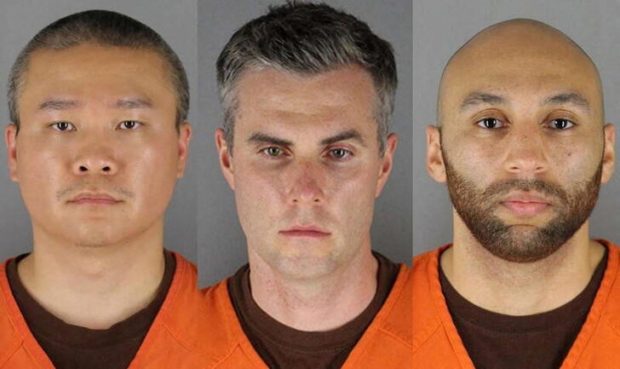
FILE PHOTO: (L-R) Former Minneapolis police officers Tou Thao, Thomas Lane and J. Alexander Kueng in a combination of booking photographs from the Minnesota Department of Corrections and Hennepin County Jail in Minneapolis, Minnesota. U.S. Minnesota Department of Corrections and Hennepin County Sheriff’s Office/Handout via REUTERS
ST. PAUL, Minn. — Three former Minneapolis officers broke the law by failing to stop Derek Chauvin from killing George Floyd during an arrest and were indifferent to the handcuffed Black man’s dying pleas, a prosecutor told a jury in opening statements in the federal trial on Monday.
Tou Thao, J. Alexander Kueng and Thomas Lane are charged with violating Floyd’s civil rights during his arrest on a road outside a Minneapolis grocery store in May 2020, video of which sparked street protests against racism and police brutality around the world.
In opening a trial that hinges on when a police officer has a duty to intervene in a colleague’s misconduct, federal prosecutor Samantha Trepel, from the U.S. Department of Justice’s civil rights division, said the defendants had broken their oath with a callous indifference to Floyd, 46.
She said video captured how Kueng at times seemed more preoccupied with some gravel lodged in the tire of the nearby police car than the man beneath him repeatedly saying: “I can’t breathe.”
Their lawyers argued that widely seen cellphone video of Floyd’s killing does not capture chaotic and even frightening events leading up to an arrest in a dangerous neighborhood.
Two of the defendants were rookies only a few days into the job, they noted, while Thao was described by his lawyer as nothing more than a “human traffic cone” who made sure onlookers and passing vehicles stayed clear.
Last year, the defendants’ former colleague Chauvin, 45, was found guilty of murder and manslaughter in Floyd’s death at the end of a nationally televised state trial in April 2021, and a Minnesota judge sentenced him to 22-1/2 years in prison.
Chauvin, who is white, was also charged alongside his colleagues by federal prosecutors with violating Floyd’s civil rights in their capacity as police officers. Chauvin changed his plea to guilty last December. Thao, Kueng and Lane, who could face years in prison if convicted, have all pleaded not guilty.
“For more than nine minutes, each of the three defendants made a conscious choice over and over again not to act,” Trepel told the jury. “They chose not to intervene and stop Chauvin as he killed a man slowly in front of their eyes on a public street in broad daylight.”
She said that the officers had sworn an oath to care for people in their custody, and were required by law to stop Chauvin and give Floyd medical aid.
Defense lawyers say the three defendants had a duty to arrest Floyd on suspicion he used a counterfeit $20 bill to buy cigarettes, and were not criminally liable for the conduct of Chauvin, who they deferred to as the most senior officer present.
Earl Gray, a lawyer for Lane, said Floyd was visibly intoxicated when Lane and Kueng first approached him and struggled against being put into the back of their police car.
“He was all muscle,” Gray said. “These two rookies simply could not get this fellow in the back seat and were clearly doing something wrong. So what does Chauvin do? He takes over and he grabs the guy and he puts him on the ground.”
Floyd’s girlfriend, Courteney Ross, said during a recess that the defendants were shirking responsibility and trying to blame Floyd for his own death.
“I know that when someone is crying out for help, the right thing to do is help them,” she said.
‘Deliberate indifference’
Prosecutors are seeking to convince the jury in the U.S. District Court in St. Paul that the men willfully failed to help Floyd during what Trepel called Chauvin’s “slow-motion killing.” The indictment says a person under arrest has a right to “be free from a police officer’s deliberate indifference to his serious medical needs.”
Thao, 36, and Kueng, 28, face an additional count in the indictment, which says they willfully failed to stop Chauvin using excessive force against Floyd, violating Floyd’s right to be free from unreasonable seizure.
Thao had worked for the Minneapolis Police Department for eight years. Lane, 38, and Kueng, who helped restrain Floyd’s lower body, had joined only a few months prior, and Chauvin was their field training officer.
Kueng was “a rookie officer” on his third shift ever on the job and was let down by his seniors with “inadequate training,” his lawyer Thomas Plunkett told the jury. Lane would take the stand in his own defense, his lawyer said.
The jury will hear from other Minneapolis police officers that the defendants were trained in how to administer medical aid to people in their custody, and taught that moving Floyd onto his side could have saved his life, Trepel said.
They will also hear from some of the horrified bystanders who shouted at the officers to check Floyd’s pulse, Trepel said.
“After Mr. Floyd lost the ability to speak, the people on the sidewalk stood up for him,” Trepel told the jury. “They understood just by seeing his body go limp, listening to his words and then listening to his silence that, unless somebody changed what was happening, he would die.”
After the federal trial, the three men face a state trial for aiding and abetting Floyd’s murder.